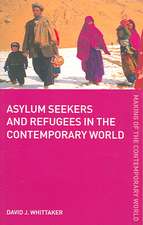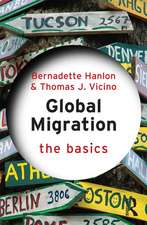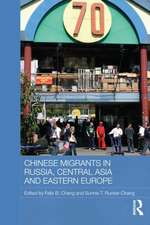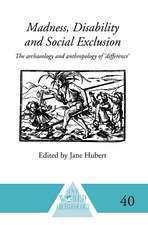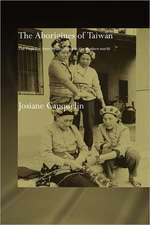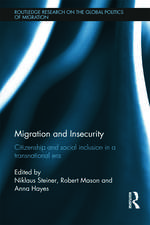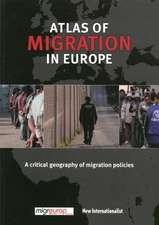Guangdong and Chinese Diaspora: The Changing Landscape of Qiaoxiang: Routledge Contemporary China Series
Autor Yow Cheun Hoeen Limba Engleză Paperback – 4 mar 2015
This book seeks to dispel such a myth. By focusing on Guangdong, the largest ancestral and native homeland, it argues that not all Chinese diasporic communities are the same in terms of mentality and orientation, and that their connections to the ancestral homeland vary from one community to another. Taking the two Cantonese-speaking localities of Panyu and Xinyi, Yow Cheun Hoe examines the hierarchy of power and politics of these two localities in terms of their diasporic kinsfolk in Singapore and Malaysia, in comparison with their counterparts in North America and Hong Kong. The book reveals that, particularly in China’s reform era since 1978, the arguably primordial sentiment and kinship are less than crucial in determining the content and magnitude of linkages between China and the overseas Chinese. Rather, it suggests that since 1978 business calculation and economic rationale are some of the key motivating factors in determining the destination and degree of diasporic engagement.
Examining various forms of Chinese diasporic engagement with China, this book will appeal to students and scholars of Chinese Diaspora, Chinese culture and society, Southeast Asian culture and society and ethnicity.
| Toate formatele și edițiile | Preț | Express |
|---|---|---|
| Paperback (1) | 485.46 lei 6-8 săpt. | |
| Taylor & Francis – 4 mar 2015 | 485.46 lei 6-8 săpt. | |
| Hardback (1) | 1060.87 lei 6-8 săpt. | |
| Taylor & Francis – 11 feb 2013 | 1060.87 lei 6-8 săpt. |
Din seria Routledge Contemporary China Series
-
 Preț: 326.21 lei
Preț: 326.21 lei -
 Preț: 339.65 lei
Preț: 339.65 lei -
 Preț: 311.41 lei
Preț: 311.41 lei -
 Preț: 280.32 lei
Preț: 280.32 lei -
 Preț: 317.85 lei
Preț: 317.85 lei -
 Preț: 350.12 lei
Preț: 350.12 lei - 18%
 Preț: 1059.45 lei
Preț: 1059.45 lei - 28%
 Preț: 848.57 lei
Preț: 848.57 lei - 18%
 Preț: 1223.21 lei
Preț: 1223.21 lei - 18%
 Preț: 1060.74 lei
Preț: 1060.74 lei -
 Preț: 422.90 lei
Preț: 422.90 lei - 18%
 Preț: 954.20 lei
Preț: 954.20 lei - 18%
 Preț: 1169.66 lei
Preț: 1169.66 lei - 18%
 Preț: 1049.84 lei
Preț: 1049.84 lei - 18%
 Preț: 1217.95 lei
Preț: 1217.95 lei - 18%
 Preț: 1222.16 lei
Preț: 1222.16 lei - 28%
 Preț: 823.99 lei
Preț: 823.99 lei - 18%
 Preț: 1061.93 lei
Preț: 1061.93 lei - 18%
 Preț: 1057.89 lei
Preț: 1057.89 lei - 18%
 Preț: 1112.03 lei
Preț: 1112.03 lei - 18%
 Preț: 1008.02 lei
Preț: 1008.02 lei -
 Preț: 416.82 lei
Preț: 416.82 lei - 25%
 Preț: 823.99 lei
Preț: 823.99 lei - 18%
 Preț: 1114.70 lei
Preț: 1114.70 lei - 15%
 Preț: 702.39 lei
Preț: 702.39 lei - 28%
 Preț: 526.88 lei
Preț: 526.88 lei - 18%
 Preț: 712.13 lei
Preț: 712.13 lei - 18%
 Preț: 1065.06 lei
Preț: 1065.06 lei - 18%
 Preț: 703.09 lei
Preț: 703.09 lei - 18%
 Preț: 1060.87 lei
Preț: 1060.87 lei - 18%
 Preț: 1057.89 lei
Preț: 1057.89 lei - 18%
 Preț: 1062.98 lei
Preț: 1062.98 lei - 18%
 Preț: 1222.16 lei
Preț: 1222.16 lei - 18%
 Preț: 1055.51 lei
Preț: 1055.51 lei -
 Preț: 413.55 lei
Preț: 413.55 lei - 18%
 Preț: 1001.84 lei
Preț: 1001.84 lei -
 Preț: 386.57 lei
Preț: 386.57 lei - 18%
 Preț: 1055.38 lei
Preț: 1055.38 lei - 18%
 Preț: 1053.95 lei
Preț: 1053.95 lei - 18%
 Preț: 1061.57 lei
Preț: 1061.57 lei - 18%
 Preț: 1058.79 lei
Preț: 1058.79 lei - 18%
 Preț: 1109.18 lei
Preț: 1109.18 lei - 18%
 Preț: 1053.47 lei
Preț: 1053.47 lei - 18%
 Preț: 1053.16 lei
Preț: 1053.16 lei - 18%
 Preț: 728.24 lei
Preț: 728.24 lei - 18%
 Preț: 1055.38 lei
Preț: 1055.38 lei - 18%
 Preț: 1165.87 lei
Preț: 1165.87 lei - 18%
 Preț: 1227.38 lei
Preț: 1227.38 lei - 15%
 Preț: 701.45 lei
Preț: 701.45 lei
Preț: 485.46 lei
Nou
Puncte Express: 728
Preț estimativ în valută:
92.92€ • 100.97$ • 78.11£
92.92€ • 100.97$ • 78.11£
Carte tipărită la comandă
Livrare economică 21 aprilie-05 mai
Preluare comenzi: 021 569.72.76
Specificații
ISBN-13: 9781138851887
ISBN-10: 1138851884
Pagini: 256
Ilustrații: 14 black & white illustrations, 85 black & white tables, 8 black & white halftones, 22 black & white line drawings
Dimensiuni: 156 x 234 mm
Greutate: 0.36 kg
Ediția:1
Editura: Taylor & Francis
Colecția Routledge
Seria Routledge Contemporary China Series
Locul publicării:Oxford, United Kingdom
ISBN-10: 1138851884
Pagini: 256
Ilustrații: 14 black & white illustrations, 85 black & white tables, 8 black & white halftones, 22 black & white line drawings
Dimensiuni: 156 x 234 mm
Greutate: 0.36 kg
Ediția:1
Editura: Taylor & Francis
Colecția Routledge
Seria Routledge Contemporary China Series
Locul publicării:Oxford, United Kingdom
Public țintă
Postgraduate and UndergraduateCuprins
1. Introduction 2. Patterns and Impacts: Guangdong and Its Different Diasporic Groups 3. Waning Ancestral Ties: Singaporean and Malaysian Chinese 4. Facing the South China Sea: Panyu Before 1978 5. Transformation: Panyu Since 1978 6. Remote in the Mountains: Xinyi Before 1978 7. Still Poor: Xinyi Since 1978 8. Conclusion
Notă biografică
Yow Cheun Hoe is Assistant Professor at Nanyang Technological University, Singapore.
Recenzii
"Guangdong and Chinese Diaspora provides a useful corrective to a clutch of earlier studies that rushed to proclaim and celebrate the reinvigoration of diasporic ties to China after 1978 without engaging in very much research to support their effusive claims. Empirically rich and theoretically engaged, this book will be of interest not only for historians and social scientists who specialize in Chinese migration, but for all scholars who are interested in human diasporas and how they change and evolve over time." - Glen Peterson, The University of British Columbia, Pacific Affairs: Volume 88, No. 4 – December 2015
Descriere
The role of the Chinese Diaspora in China’s recent economic success has created a myth that their relations with China is natural and primordial, and that regardless of their base outside China and generation of migration, the Chinese Diaspora are inclined to participate enthusiastically in China’s social and economic agendas. By focusing on Guangdong, this book seeks to dispell such a myth, and argues that not all Chinese diasporic communities are the same in terms of mentality and orientation, and that their connections to the ancestral homeland vary from one community to another.




